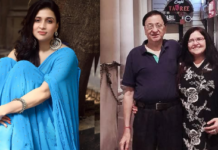
Bollywood actress Shefali Jariwala, who rose to fame with the iconic 2002 music video Kaanta Laga, died suddenly on June 27, 2025, at the age of 42. According to early reports, she died of a cardiac arrest, but as more evidence comes to light, it appears that a combination of fasting, a Satyanarayan Puja, and unsupervised health supplements might have played a major role in her sudden death. Her tragic demise has left fans and the entertainment industry in shock.
On the morning of her death, Shefali had performed a Satyanarayan Puja, a traditional Hindu ceremony conducted for well-being, peace, and prosperity. As part of the ritual, she was observing a fast, which meant she had not eaten for several hours. She reportedly remained without food for most of the day and consumed only leftover food from the previous day in the evening. While fasting is a spiritual practice for many, combining it with medications or supplements can sometimes have dangerous effects on the body, especially without medical guidance.
Her Final Hours: A Sudden Collapse and Rush to Hospital
Late in the evening, around 10:30 PM, Shefali collapsed in her home while her husband, actor Parag Tyagi, was out walking their dog. The house help immediately called him to inform about Shefali’s condition. Parag rushed back in the lift, while the domestic help went down to attend to their elderly pet. When Parag reached Shefali, he found her unconscious but with a faint pulse. Her eyes were closed, and she was unresponsive, with what he described as a “dead weight” to her body. Realizing the severity of the situation, he rushed her to Bellevue Multispeciality Hospital in Mumbai’s Andheri area. Sadly, doctors declared her dead on arrival.
Doctors Suspect Cardiac Arrest, Possibly Due to Fasting and Medication
The following day, a post-mortem examination was conducted at R N Cooper Hospital in Juhu. The preliminary findings suggested cardiac arrest as the immediate cause of death. However, police and medical sources have noted that the combination of prolonged fasting and consuming medication on an empty stomach could have resulted in a dangerously low blood pressure, leading to her sudden collapse.
This tragic chain of events has raised concerns about the health practices Shefali followed in her personal life. Reports have emerged suggesting that Shefali frequently used anti-aging and skin-lightening treatments, including intravenous (IV) drips of vitamins and other substances. On the night of her death, she reportedly took a Vitamin C IV drip, which some friends say she had used regularly.
Skin-Whitening and Anti-Ageing Medicines Found at Her Home
During the police investigation, officials searched Shefali’s residence and discovered several health and beauty-related products, including “skin glow” tablets, anti-ageing pills, vitamin supplements, and glutathione vials—a chemical substance promoted for skin-brightening purposes. These supplements are often used by celebrities to maintain a youthful appearance, but many of them come with risks if not administered under professional medical supervision.
Her friend, actress Pooja Ghai, confirmed that Shefali had been taking glutathione and Vitamin C drips, and even took one such drip on the evening she passed away. Pooja stated that these drips are popular in places like Dubai and are considered common there, but in India, such treatments often lack proper regulation. The lack of medical oversight in Shefali’s case has become a growing concern.
No Signs of Foul Play, But Police Continue Investigation
Police have confirmed that they were notified within an hour of Shefali collapsing. They reached Juhu hospital late that night and began recording statements. The police have spoken to her husband Parag Tyagi, other family members, their house staff, and close friends to understand the full circumstances around her death. While there is no suspicion of foul play, they have taken the necessary step of preserving Shefali’s viscera—tissue samples that will be analyzed at the Kalina Forensic Science Laboratory. This report will help determine the exact cause of death and could take up to three months to complete.
Authorities believe that Shefali’s collapse may be the result of a combination of fasting, over-the-counter supplements, and a possible reaction between various medications. Her family has admitted that many of these treatments were taken without a doctor’s prescription or oversight.
The Pressure to Stay Young in Showbiz
Shefali’s death has sparked debate around the pressures celebrities face to look youthful and stay camera-ready. The entertainment industry, especially for women, often promotes age-defying beauty standards, leading many to turn to cosmetic treatments, fad diets, and unverified beauty supplements.
Shefali, who was still active on social media, often shared photos and videos where she looked radiant and fit. Her death came as a shock because just days before, she had posted happy updates, and there were no public signs of ill health. However, behind the camera, it now appears that she may have been quietly struggling with a demanding beauty routine that involved intravenous treatments and unregulated pills.
A Career That Began with “Kaanta Laga”
Shefali Jariwala became a household name in 2002 with the remix of the song Kaanta Laga. The song’s bold visuals and her confident appearance made her an overnight sensation. She quickly rose to fame and appeared in other music videos and films, including Mujhse Shaadi Karogi. While her movie career didn’t take off in the way many had expected, she remained a familiar face on Indian television, particularly in reality shows like Bigg Boss 13.
Her marriage to actor Parag Tyagi was often in the news, and the couple appeared happy and health-conscious. They were known for their pet-loving lifestyle and were often seen walking their dog or posting couple moments online. Her sudden departure has left a deep void in their lives and among her fans.
A Wake-Up Call About Celebrity Health Trends
As tributes pour in for Shefali, the circumstances of her death are serving as a wake-up call about the dangers of unmonitored wellness practices. The widespread use of glutathione, IV therapy, and other supplements for aesthetic purposes needs to be discussed openly. While such treatments may appear harmless or even glamorous, the risks involved—especially when taken without food, during fasting, or without doctor’s supervision—can be fatal.
Medical professionals warn that fasting lowers blood sugar and blood pressure, which makes the body more vulnerable. Adding any kind of drug or supplement into this condition can result in organ failure, unconsciousness, or sudden cardiac arrest, especially in people who might already have underlying health conditions.
After the autopsy, Shefali’s body was handed over to her family and she was cremated in Mumbai. Her fans gathered online to express their grief, sharing clips of her performances, interviews, and dance videos that once lit up screens across the country.
The final cause of her death will only be confirmed once the forensic report is completed. Until then, speculation will continue, but one thing is clear: health and wellness must always come with caution and medical advice. No matter how popular or trendy a treatment may be, its risks should never be ignored.
Shefali Jariwala’s life and death serve as both a tribute to a beloved artist and a cautionary tale about the high price of beauty in the entertainment world.


































